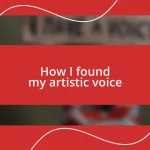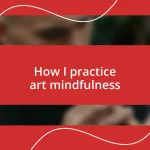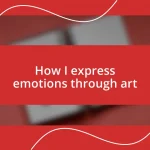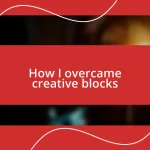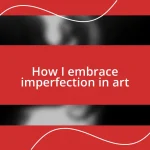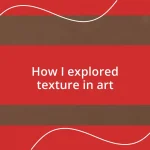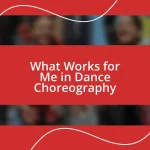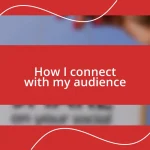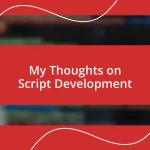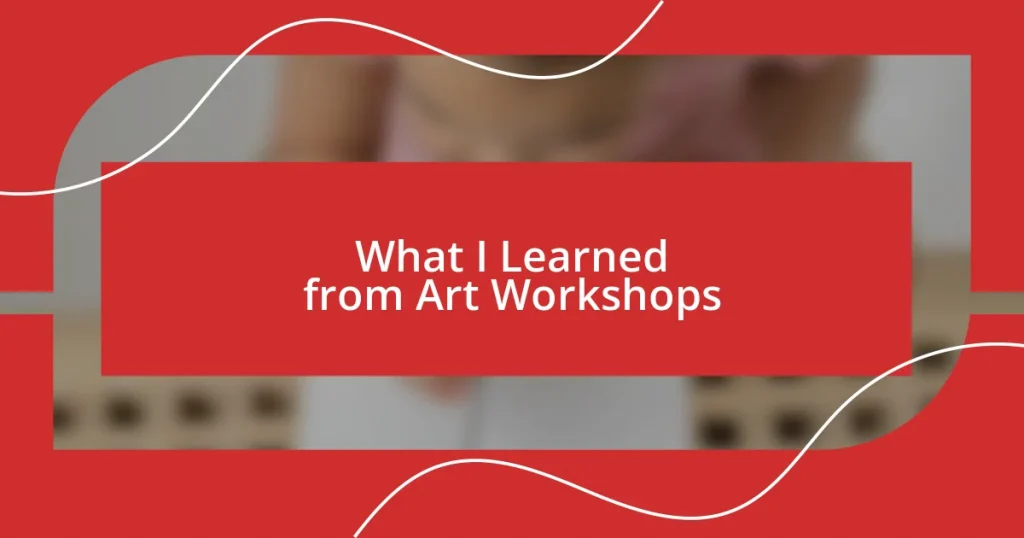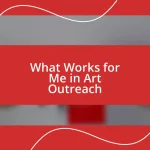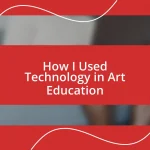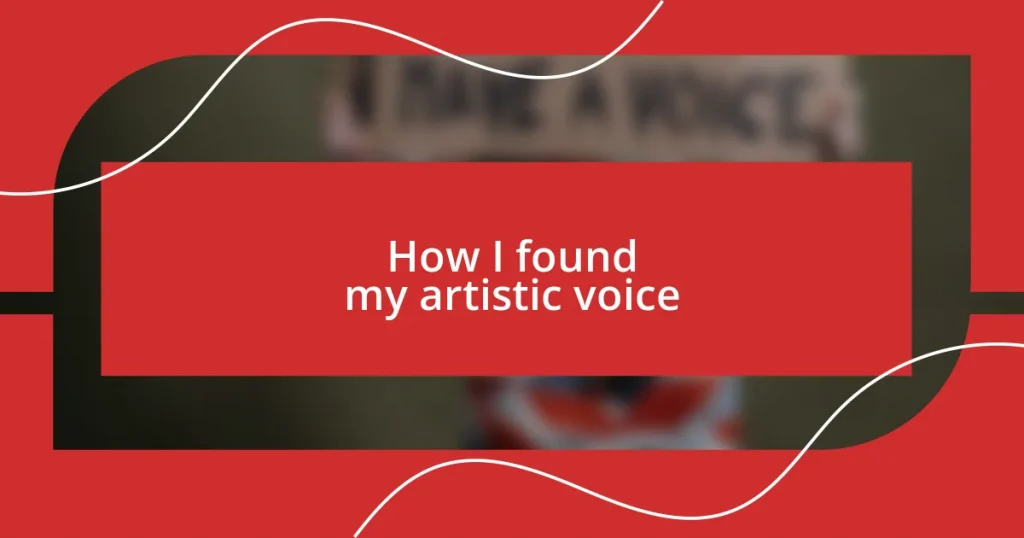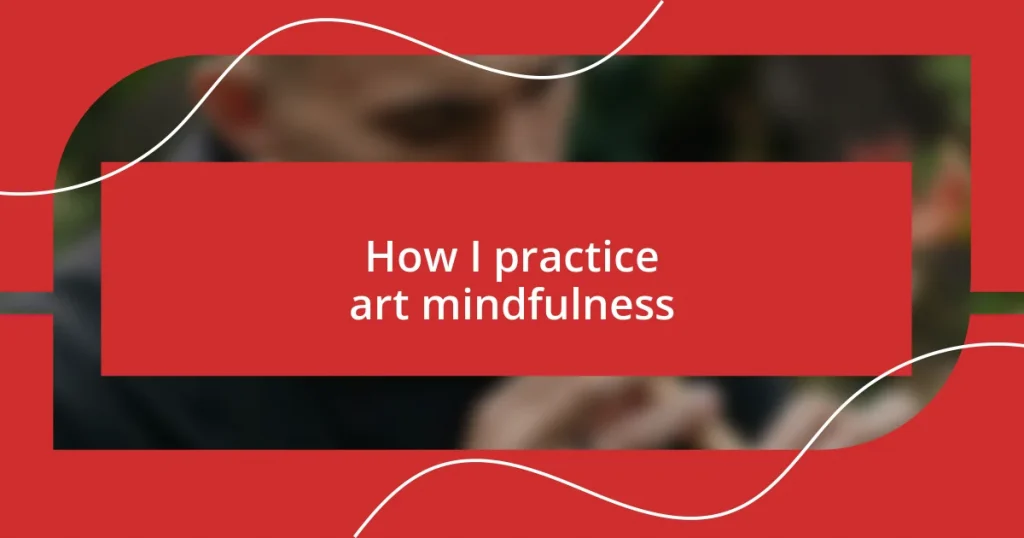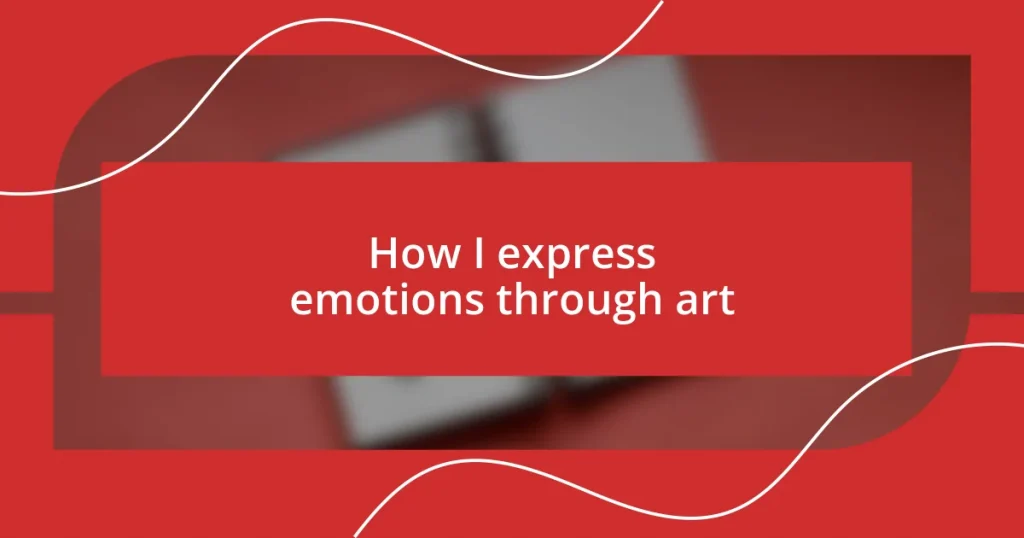Key takeaways:
- Art workshops foster creativity, community, and collaboration, enhancing both skills and personal connections among participants.
- Key benefits include immediate feedback, skill enhancement, and networking opportunities that can lead to lasting artistic relationships.
- Personal growth emerges through confronting insecurities, exploring vulnerabilities, and applying learned techniques to enhance artistic practice significantly.
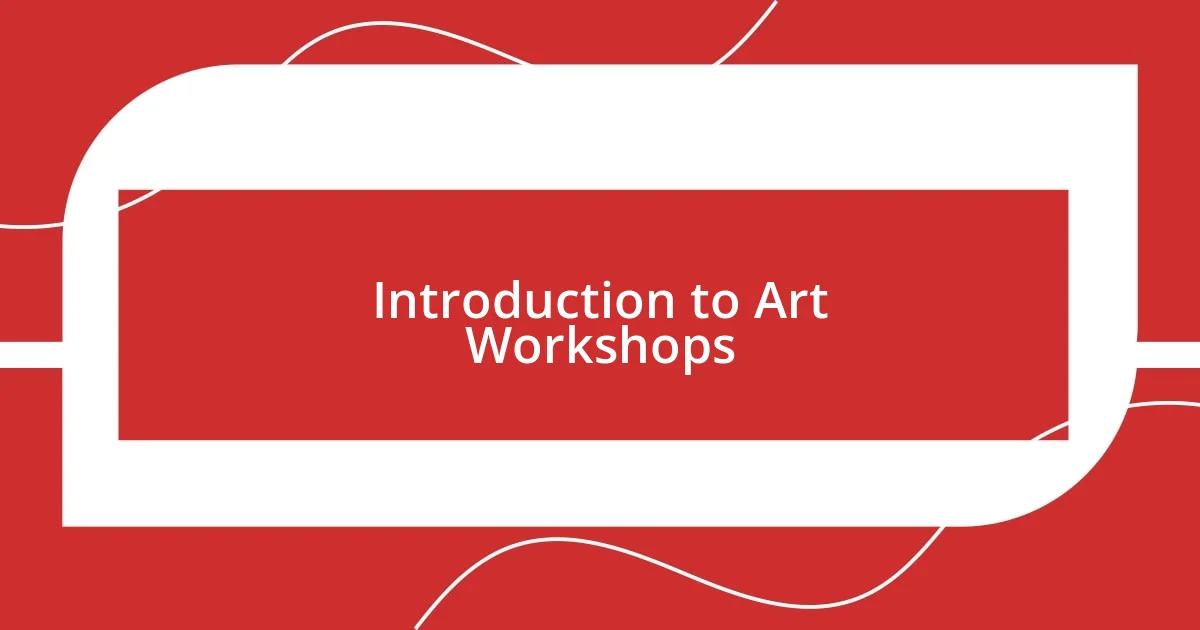
Introduction to Art Workshops
Art workshops offer a unique space for creativity and exploration. I remember walking into my first workshop, feeling a mix of excitement and nervousness. Would I be able to keep up? The atmosphere buzzed with energy, and it quickly became clear that this was a place where judgment was left at the door.
Each session opened my eyes to new techniques and perspectives that I had never considered before. For instance, when we experimented with colors, I could feel a freeing sense of expression emerging from within. Have you ever felt that rush of inspiration when trying something out of your comfort zone? It’s exhilarating!
Workshops not only enhance artistic skills but also foster a sense of community among participants. The connections I made during those sessions were invaluable, as we shared our triumphs and challenges. I still think about the stories we exchanged while we mixed paint or sculpted clay, realizing that creativity often thrives in collaboration and shared experiences.
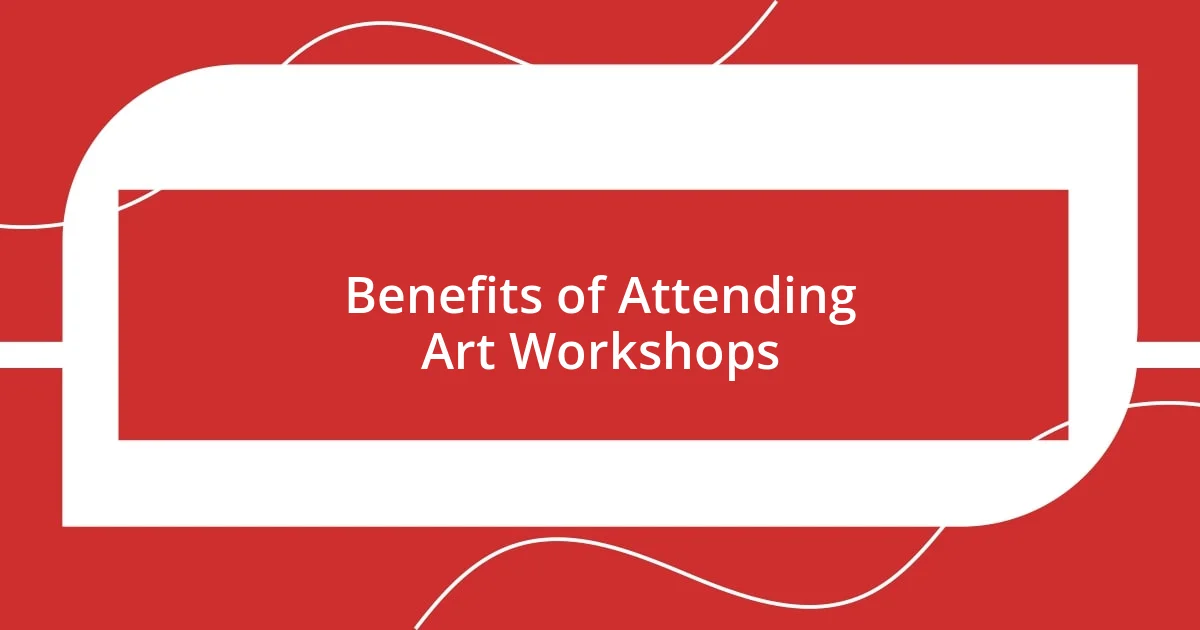
Benefits of Attending Art Workshops
The benefits of attending art workshops are numerous and profound. For me, one standout benefit is the immediate feedback I received from both instructors and peers. I vividly recall a moment during a mixed media workshop when an instructor took the time to suggest minor adjustments to my piece. This small act completely transformed my work and boosted my confidence. Knowing that constructive criticism is offered in a supportive environment cultivates growth and improvement that self-study often lacks.
Here are some key benefits of attending art workshops:
- Skill Enhancement: Learn new techniques and refine existing skills in a hands-on setting.
- Creativity Boost: Experience fresh ideas and perspectives that can spark new inspiration.
- Networking Opportunities: Connect with fellow artists and professionals, leading to potential collaborations.
- Constructive Feedback: Receive immediate and personalized guidance to elevate your work.
- Emotional Expression: Art provides a therapeutic outlet for emotions, fostering mental well-being.
Every workshop I attended not only enriched my artistic toolkit but also created lasting friendships that continue to inspire me. The collective energy and creativity in those spaces struck a chord, making me realize how important community is in the artistic journey.
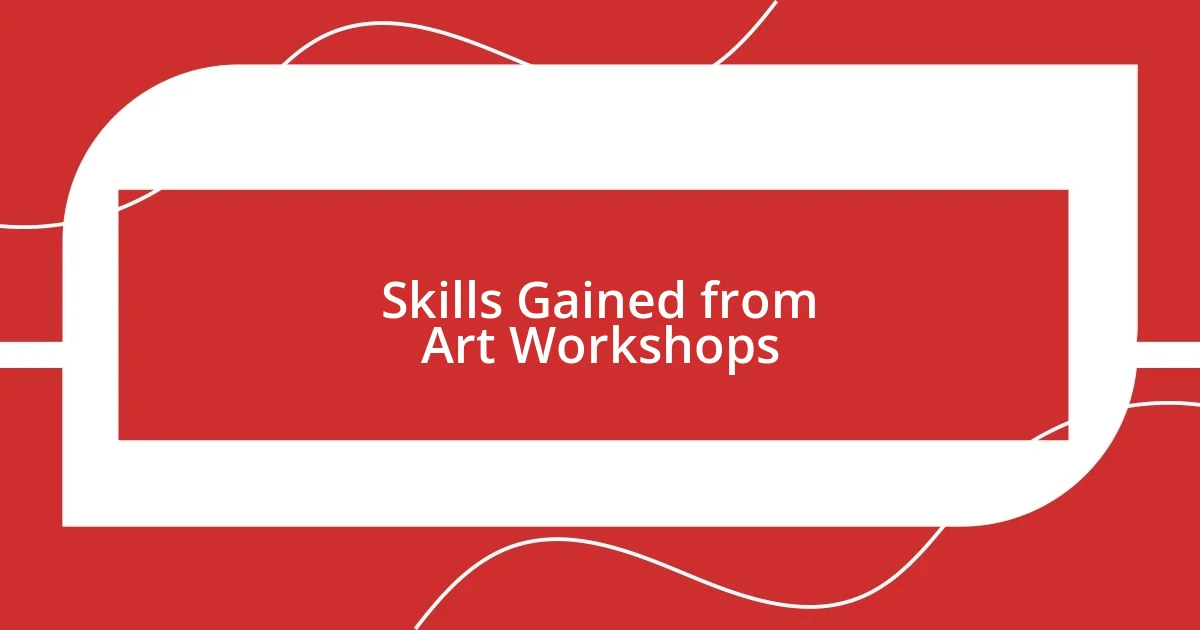
Skills Gained from Art Workshops
During my art workshops, I discovered that one of the most significant skills I gained was adaptability. I remember a particularly challenging session where we were tasked with creating a project using only three colors. Initially, I felt limited, but as I explored different techniques, I found ways to blend those colors creatively. It taught me that limitations can actually enhance creativity rather than stifle it. Have you ever been pushed to think differently? That feeling of breakthrough is incredibly rewarding.
Another essential skill developed through these workshops was the ability to collaborate effectively. Working in groups often meant combining different ideas into a singular vision. I recall a group mural project where each person contributed their individual style, creating a vibrant tapestry that reflected us all. That experience highlighted the importance of listening and respecting others’ perspectives, which ultimately led to producing something far more impressive than I could have achieved alone. It’s funny how teamwork can lead to such rich artistic outcomes, isn’t it?
Lastly, I honed my observational skills during these workshops. Engaging with various art forms and styles deepened my understanding of visual language. I can still picture how we spent an entire session just studying the light and shadow in still-life setups. This practice sharpened my ability to notice details in my surroundings. I became more conscious of the world around me, which is a gift that extends beyond art. Does becoming more observant resonate with you too? It transforms how we approach not just our art, but life in general.
| Skills Gained | Description |
|---|---|
| Adaptability | Learning to create within limitations, enhancing creative thinking. |
| Collaboration | Working with others led to richer collective works and improved listening skills. |
| Observational Skills | Heightened awareness of visual details improved both art and life perception. |
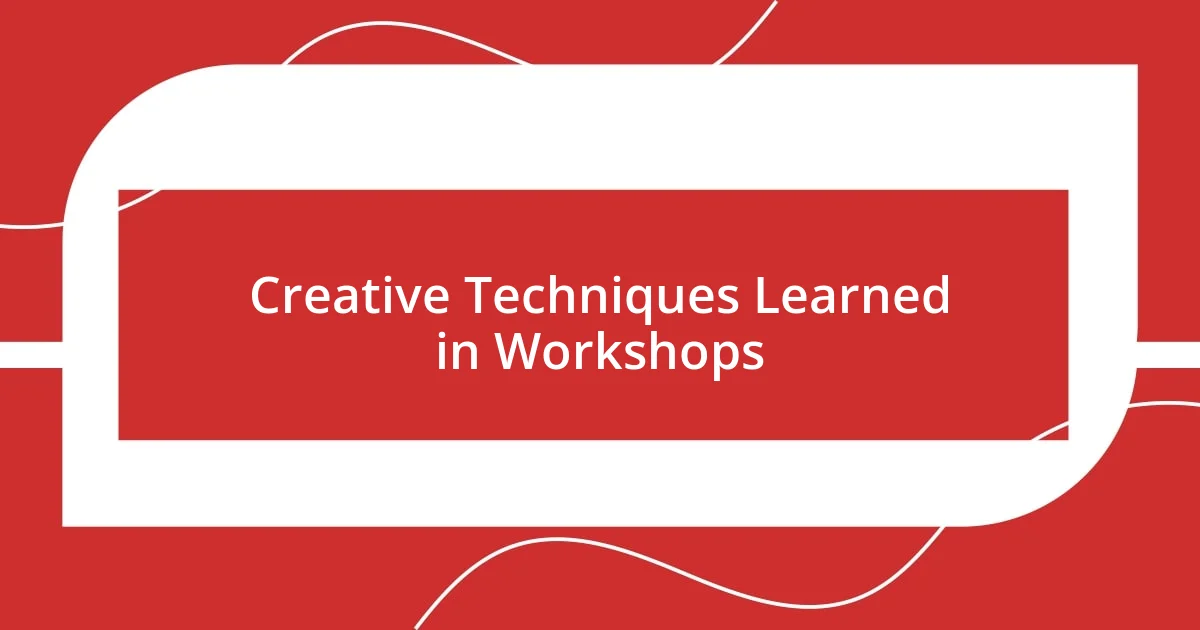
Creative Techniques Learned in Workshops
One creative technique I picked up during a workshop involved experimenting with different textures using everyday materials. For instance, we were encouraged to incorporate items like fabric and sandpaper into our paintings. Initially, I thought it was an unusual approach, but once I started layering these materials, my piece came alive in ways I hadn’t anticipated. Have you ever found inspiration in the most unexpected places? It’s amazing how simple objects can open up a whole new dimension in art.
Another memorable creative technique was the “art relay” exercise we did, where each participant would add to a piece without prior discussion. This method not only challenged us creatively but also fostered spontaneity. I remember the thrill of seeing how my additions interacted with someone else’s work, creating a collaborative piece that transcended our individual styles. It was a delightful reminder that sometimes, letting go of control can lead to wonderful surprises. Have you ever discovered something extraordinary by simply going with the flow?
In one workshop, we explored the idea of storytelling through art. I learned to think about the narrative behind my pieces, asking questions like, “What emotions do I want to convey?” and “How does this color reflect the story I want to share?” It was like unlocking a door to deeper layers in my work. During that session, as I painted a scene depicting a significant moment from my life, I felt an emotional release that made every stroke purposeful. How often do we take time to infuse our art with personal stories? This technique not only elevated my artwork but also connected me to my own experiences in a profound way.
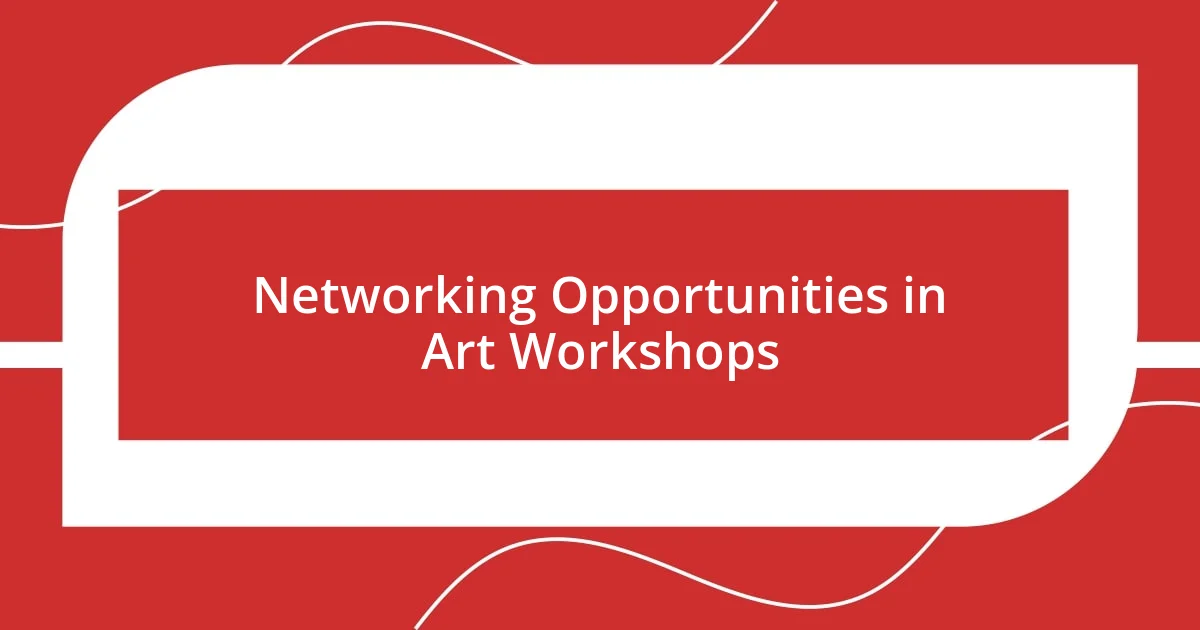
Networking Opportunities in Art Workshops
I can’t emphasize enough how enlightening networking can be in art workshops. During one session, I met a fellow artist who ended up becoming a mentor to me. We bonded over our shared love for abstract art, and he shared invaluable resources that completely transformed my practice. Have you ever connected with someone in a way that felt serendipitous? Those moments can truly shape your artistic journey.
Another memorable experience was during a collaborative project where participants were encouraged to share their artistic journeys. Hearing others’ stories about challenges and breakthroughs sparked a sense of community that I hadn’t anticipated. I remember feeling inspired as someone shared their route to overcoming creative blocks, which resonated with my struggles. Isn’t it powerful how a simple conversation can ignite motivation?
Lastly, the art workshops also facilitated connections that extended beyond the studio. After one engaging day, several of us organized a social event to keep the creativity flowing. This informal setting led to brainstorming sessions and the formation of a collective that still meets to this day. I found that these connections enriched not only my work but also my life. Have you ever stumbled upon a group that empowers you to push your artistic boundaries? These opportunities for collaboration became an essential part of my growth.
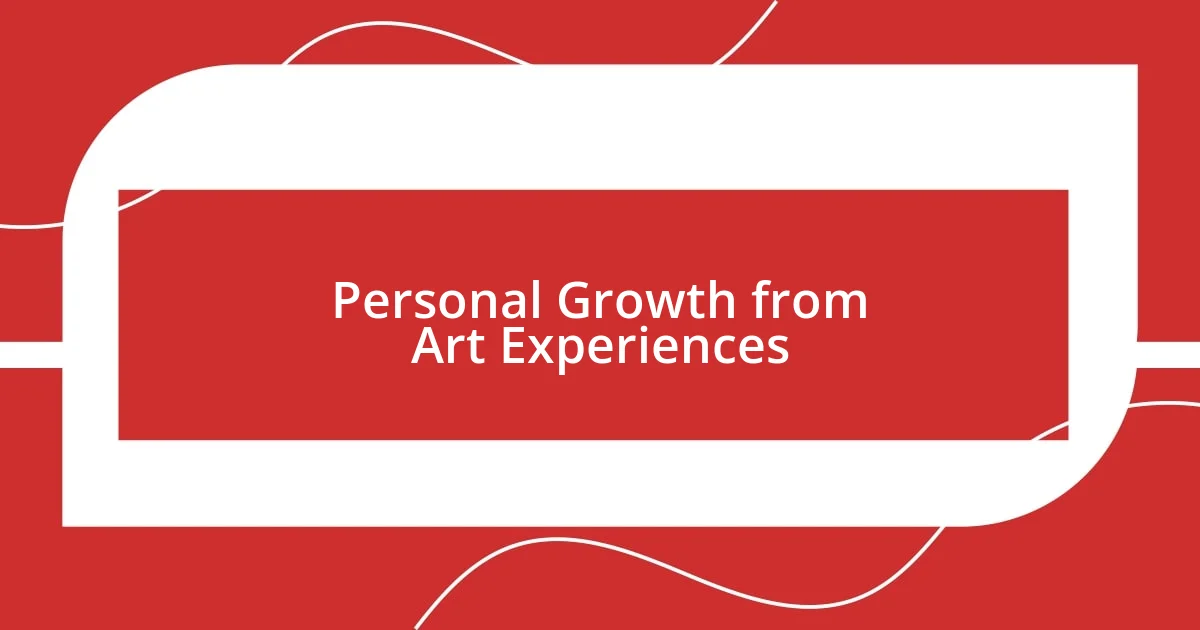
Personal Growth from Art Experiences
When I reflect on my time in art workshops, I recognize profound moments of personal growth. For example, during a session focused on self-portraiture, I initially felt a wave of self-doubt. Yet, as I painted, I began to confront my insecurities on the canvas. Each brushstroke felt like a step toward self-acceptance, pushing me to embrace my imperfections. Have you ever found art to be a mirror that reflects your inner self?
One exercise that left a lasting impression involved creating a piece that represented our fears. By translating those emotions into colors and shapes, I discovered new layers to my understanding of anxiety. It was liberating to visualize what once felt overwhelming. The process reminded me that vulnerability can be a source of strength. Have you explored your vulnerabilities creatively?
Another transformative experience came from a workshop centered on mindfulness through art. Focusing entirely on the present moment while building my piece helped quiet my racing thoughts. As I lost myself in the rhythm of the brush, I found tranquility that I hadn’t experienced in a long time. Isn’t it incredible how art can ground us in the now and open up pathways for clarity? These workshops have taught me that art is not just about the final product, but about the journey of self-discovery along the way.
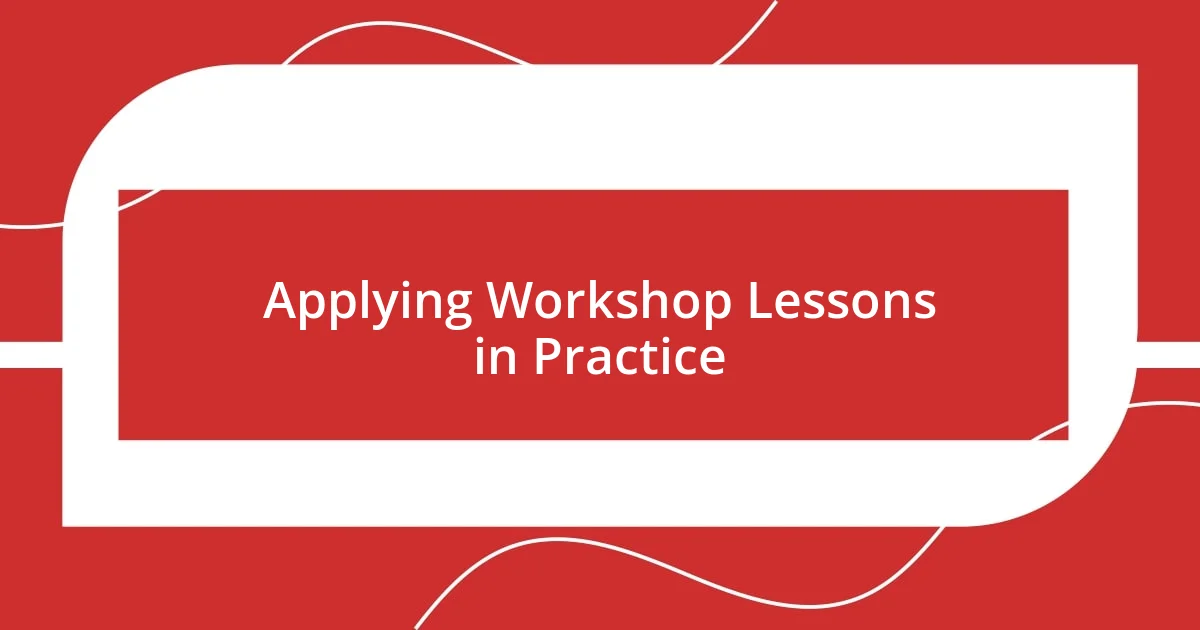
Applying Workshop Lessons in Practice
Applying the lessons learned in art workshops continues to influence my artistic practice in profound ways. I remember one specific lesson about choosing a color palette. It encouraged me to experiment more boldly instead of sticking to my usual neutrals. When I applied this at home, I created a vibrant piece that surprised not only me but also my viewers. Have you ever surprised yourself by stepping out of your comfort zone in your art?
Moreover, the workshop emphasized the importance of routine and focused practice. I felt a bit daunted by the idea of creating daily but decided to start small with five minutes a day. Surprisingly, those five minutes morphed into an hour as I lost track of time. It taught me that consistency ultimately nurtures creativity. Doesn’t it feel incredible when your passion takes the driver’s seat unexpectedly?
One insightful technique I picked up was the concept of ‘intentional mistakes.’ At first, I thought it was ridiculous—how could mistakes be intentional? But I soon realized that embracing errors during a piece could lead to unexpected breakthroughs. So, I started to leave in my “blunders,” and they often became the most captivating aspects of my work. Isn’t it fascinating how what we perceive as flaws can sometimes add the most character?
